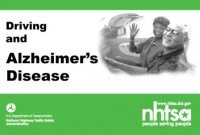Alzheimer's and Driving

Alzheimer's disease compounds the physical changes that accompany aging, which can undermine driving skills. Yet, studies from Brown University and Washington University indicate that patients can drive through the very early stages of the disease. The August 2008 Harvard Mental Health Letter (HMHL; sub) reports the Brown study of 84 patients with early Alzheimer's and 44 healthy older controls. All of the latter passed an initial driving test as compared with 88 percent of those with "very mild" Alzheimer's and 78 percent of those with "mild" Alzheimer's. Time to failure of the driving test was a median of 324 days (~11 months) for those with mild Alzheimer's, and nearly twice as long, 605 days (~20 months) for those with very mild disease. To handle the situation, HMHL recommends broaching the issue early, "while discussing other aspects of care," and documenting the patient's driving patterns. "Although patterns of behavior are what matter, citing specific incidents [?] to make the case may help convince a patient to surrender the keys," according to HMHL. The newsletter also recommends having a third party, such as clinician or friend present during conversations about driving.

I'm a freelance journalist covering science, medicine, and automobiles.
More by David C. Holzman


































Comments
Join the conversation
My brother was diagnosed with Early Onset Alzheimers when he was 59. He drove for five years and I became concerned after two when he overfilled the oil in his pickup, forgetting that he had already done so the day before. My brother-in-law, a former police officer, was good enough to drive with him from time to time and even at five years said "He may not necessarily remember if he put oil in the car, but his driving skills remain far higher than the average person. My brother drove race cars for several years, and thus likely had great body memory about driving. We finally took his keys from him after he had gone out several times, parked and then totally spaced on where the truck was parked. He would call, panicked and lost somewhere to tell us that he thought it had been stolen. He still was sufficiently in denial about the disease that he was terribly embarassed (as if it was his fault) about his inability to remember where the truck was parked. A therapist told me once that denial is one of the common defenses the individual uses against the disease, and suggested it was probably healthy since it did no good to ponder its course during those periods of lucidity which every Alzheimer's afflicted person seems to have. It is a tragic disease, but from my observation the Alzheimers patient is probably far less hazardous to his fellow drivers than the woman in Suburban juggling coffee and a cell phone.
Easy answer here. You get diagnosed with Alzheimers stop driving. You might not be a danger to crash. But there are other dangers like getting lost or wandering into areas that leave you lost. Dozens of ways for this to end badly. Guess it might tread on guidelines, but this is a BS topic if there ever was one. You got Alzheimer's then don't drive.
esldude wrote: "You got Alzheimer’s then don’t drive." I went to my doctor and he said, "I've got some good news and some bad news." I said, "Tell me the bad news first, doc." He said, "You have terminal cancer and only six months to live." I said, "so what is the good news?" He said, "You've got Alzheimers." I said, "So what is the bad news?"
Had a relation who developed Alzeihmers - he could still drive quite compently for quite some time. Downer was that whilst he could drive he had no idea where he was going and when he evenyually arrived he didn'y know how to get back home. A crash evenyually finished his driving days. Sad